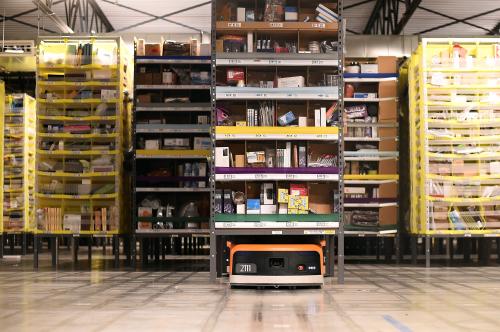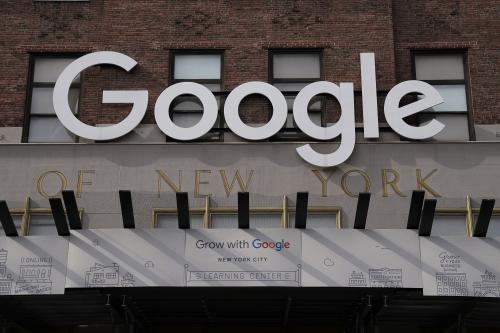Back in 2014, former Brookings scholar Robert Litan presciently warned that regulating broadband providers like public utilities in order to protect Net Neutrality, “could one day boomerang on certain major tech companies, too.” Three years later, that boomerang is now coming back with a vengeance. As progressive luminaries like Tim Wu and Susan Crawford continue fighting for utility-style regulations for broadband providers, prominent conservatives like Tucker Carlson and Steve Bannon have begun demanding similar utility-style regulations for other internet “gatekeepers,” including major websites and online platforms like Google and Facebook.
The targets are different, but the arguments attempting to justify these regulations are surprisingly similar. In a nutshell: big corporations have too much control over the free flow of information online, so the government must regulate internet gatekeepers like public utilities in order to protect users from harmful censorship or other discriminatory behavior.
Even if you accept the premise of that argument — and reasonable minds disagree over just how much control is too much for one corporation to have — it’s far from clear that utility-style regulation is the proper response. Indeed, in the dynamic markets for internet services, imposing true utility-style regulations would be a huge mistake.
Public utilities can take multiple forms, but the hallmark of each is a lack of competition. The markets for broadband, search, social media, operating systems and other internet services may be concentrated — to varying degrees — but they don’t fit the public-utility model, because real competition is possible (even if it’s not as fierce as we’d like it to be). The utility model denies that possibility, and is essentially a self-fulfilling prophecy: By giving up on market forces and ceding dominance to a single firm, utility-style regulation makes future competition impossible.
Left unchecked, this vicious cycle — where regulation depresses competition, thus justifying more regulation that further depresses competition, and so on and so forth — could wreak havoc throughout the internet ecosystem. Do we really want internet services to be provided by Government-backed monopolists, rather than by private firms competing to serve consumers in the best way possible?
Fortunately, strong antitrust and consumer protection laws can save us from this downward spiral of utility-style regulation. Antitrust law has regulated competition throughout the American economy for over a century, with fairly positive results. When internet gatekeepers used their market power to suppress innovation (AT&T), suppress competition (Microsoft) or fix prices (Apple), antitrust law was there to keep them in check. Thus, it’s no surprise that a range of scholars are now calling for antitrust law to be used against today’s internet gatekeepers, including in the context of Net Neutrality.
However, other scholars believe that antitrust alone isn’t up to the task, as it has several potential shortcomings that are relevant here. For example, how would antitrust resolve difficult questions of market definition and substitutability in the context of the internet? And how can antitrust properly account for non-economic factors, like the various cultural and societal benefits enabled by the free flow of information online? That body of law is simply incapable of recognizing and accounting for various intangibles, like conceptions of fairness and equality, which we consider to be valuable goals.
Thankfully, we also have consumer protection law to draw upon. The classic model of consumer protection is Section 5 of the Federal Trade Commission Act, which prohibits all “unfair or deceptive acts or practices” in commerce. In the context of internet services and gatekeepers, this model could be used to great effect. For example, if a gatekeeper holds itself out as a neutral platform or conduit, but secretly engages in censorship or unfair discrimination, that’s arguably “deceptive” and illegal. Similarly, if a gatekeeper fails to disclose relevant information to users (say, its policies for either publishing or blocking offensive speech), that’s arguably “unfair” and illegal.
These basic consumer protection tools could resolve much of the concerns over Net Neutrality, too. Indeed, the Federal Communication Commission’s 2015 Open Internet Order provided several consumer protection tools, including a “reasonableness” standard similar to the FTC’s authority under Section 5 and a transparency rule requiring broadband providers to make certain disclosures regarding their traffic management practices, which might not be “unfair” to withhold, but which would make the internet ecosystem more open and competitive if disclosed. The FCC is likely to soon reconsider key portions of that Order, mostly because the utility-style regulations in Title II of the Communications Act (which were not enforced by the 2015 Order, but which remain on the books) are arguably depressing broadband investment.
Hopefully the FCC won’t throw the baby out with the bath water. Removing the bright-line prohibitions on certain practices may be defensible, but the agency must not abandon its basic consumer protection framework for Net Neutrality. Ideally, that framework would closely mirror the FTC’s approach under Section 5, so the standards for antitrust and consumer protection can apply consistently throughout the internet ecosystem. Some may feel that utility-style regulations are appropriate for some gatekeepers and not others, but this ignores the reality of the situation: broadband providers have the ability to block or censor information online, but so do websites, operating systems, registrars and many others.
In order to protect both consumers and competition, we need to regulate all of these internet gatekeepers, including broadband providers and other actors in the ecosystem with the power to censor or distort the free flow of information online. However, we shouldn’t regulate them like public utilities, as that will only serve to depress competition and hurt consumers over the long run. We need to embrace strong antitrust and consumer protection laws instead.
Google, Facebook, Microsoft, and AT&T are donors to the Brookings Institution. The findings, interpretations, and conclusions posted in this piece are solely those of the author and not influenced by any donation.
The Brookings Institution is committed to quality, independence, and impact.
We are supported by a diverse array of funders. In line with our values and policies, each Brookings publication represents the sole views of its author(s).







Commentary
For internet gatekeepers, consumer protection laws are better than utility-style regulation
September 26, 2017